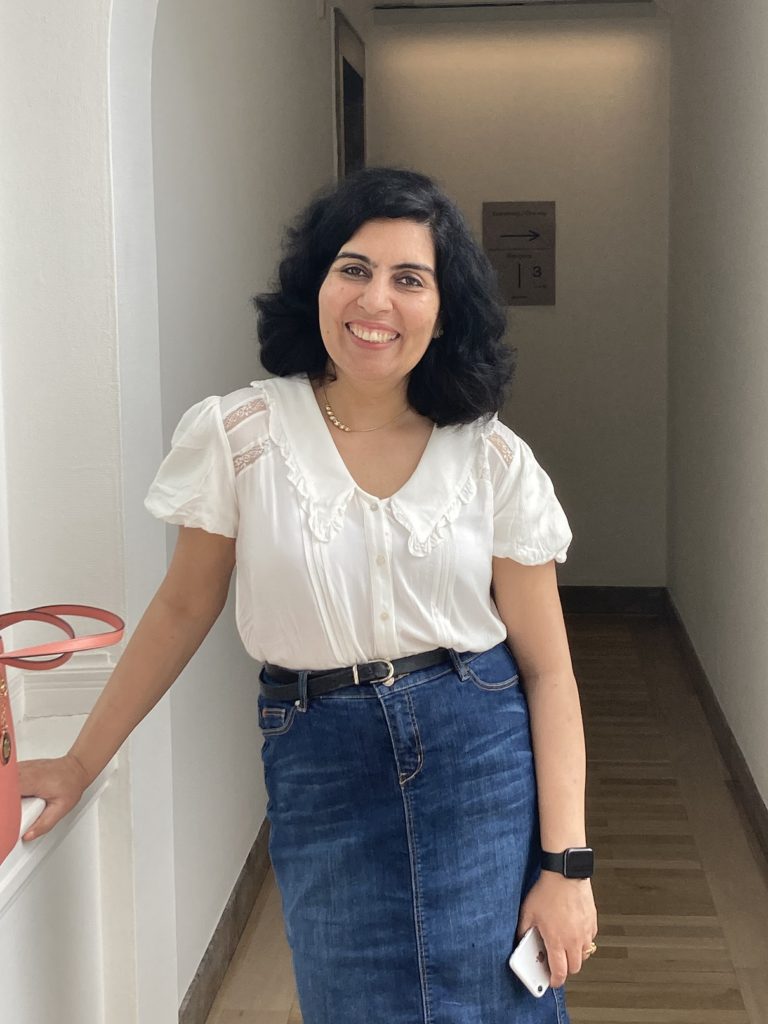Sweden was my first international move with a nine-year-old daughter. It was in many ways courageous on my part to leave the comfort of familiarity and enter disruption. This was also my first exposure to an international culture that was drastically different in many ways. In my stay in India for 37 years, I always tried to make a fine balance between western and eastern parenting styles and movement to Sweden asked me to work more towards creating that balance.
Each parent has a set of morals to be passed on to the next generation. My focus was to share my values and give enough freedom to her to grow into a responsible person. There was no other value stronger for me than being answerable for yourself. Things I understood from the beginning of my motherhood was – to walk my talk, use my experience and follow my intuition.
The movement to Sweden exposed me and my family to a culture that was unique, beautiful, and distinct in many senses. I knew soon my daughter would go to an international school where multiple cultures would merge to create a harmonious environment. Should I be worried? How to prepare her? What can she expect and not expect?
As much, I wanted her to value and remember her own culture I knew I was opening her to a new world where children from multiple cultures congregate. She was still nine when I educated her about menstruation, which I wouldn’t have done back in India till she was eleven or twelve.
Openness was one important lesson I learned through Swedish culture. Tell what it is instead of what it is not, be as much honest as possible, present age-appropriate facts, don’t hover around the topic, attend to the queries mindfully and when you don’t know accept it. I am not saying I wouldn’t have done the same in India, but the shame culture wouldn’t have let me put the information as confidently as I managed here.

There is a notion that western culture is much more advanced than Asian. It is true in many aspects but when it comes to parenting few things that I found common was that every parent:
– loves their child.
– has best intentions for the child
– wants the child to be healthy and happy
Nothing unusual about this. But it helps to accept every parent beyond judgement and drop the shame of being terrible at parenting.
Another fact that equally holds value is that every parent is finding their way to raise kids to the best of their abilities while bearing a pinch of guilt in their heart.
Nonetheless, there are a few significant things I learned from Swedish culture when it comes to parenting and I wish some of them to make its ways into my culture.
Don’t feel guilty if you are a working parent especially if you are a working mom. If you respect and enjoy what you are doing, your child will understand. If you want to be financially independent, be proud of it and not guilty. Your child will learn to support you and be independent in her ways. I see children of working moms are far more resilient. My decision to work sets an example of equal contribution and respecting self-sufficiency to my daughter. There is no urge to compensate for the lost time through expensive gifts or pampering because she is learning bigger lessons of life like self-respect and independence.
If a mother steps into an office, a father into a kitchen or clean the bathroom. Another big lesson I learned through this western culture is an absence of a permanent name tag on the household chores. The labour cost in this country is far too high to appoint a cook or a cleaner. Kids are taught to prepare food, clean house, wash clothes, fix broken stuff etc. In some families, a fifteen-year-old is given an allowance to prepare one meal a week. There is no job defined as per gender, equality is not just practised within the political system but starts from the everyday household. They train the child from a young age to learn different jobs and to respect every person irrespective of financial status.
An 18-year-old is qualified as an adult by every society. And an adult must know how to live independently. A teenager in this society knows that the ending of school comes with another major transition – live on your own. Share an apartment with friends, live in a hostel, or get your place, the child is in the mindset that with the beginning of college comes the responsibility of accommodation. I found youngsters into different jobs earning their living, and none of the jobs is measured on the scale of status. From an early stage, children are conditioned to be self-sufficient.
A friend gasped on hearing that we stay with parents till our education is complete and many times even after marriage. This aspect of my culture has the benefit of supporting family emotionally and physically. Socialising gets far easy, and we grow strong bonds with each other.

Health and Work-life balance is a priority. The majority of Swedes stay active in sports throughout their life. This sets an example for the children to be physically fit and learn about work-life balance. Most of them are into multiple sports that keep them fit. Just because a teenager turns into an adult, sports doesn’t cancel out from life. You can find a fifty-year-old swede running, mountaineering, hiking, biking, or skiing.
I learnt that sport was an active part of people in this country. As an Indian, this becomes the least of the priority as we move into college or get into a job. Life priorities change as we finish our education. The focus goes on finding a job and trying to be financially stable. I realised that Swedish people take personal, physical, and mental growth far more seriously than being financially stable. They love to travel and enjoy sports than being worried about a job.
Parents give liberty and allow their children to make mistakes. You would find a worried parent, but helicopter parenting is unusual in Swedish culture. After moving to Stockholm, I questioned myself why Indian parents feel paranoid while raising kids, and why they are obsessed with good grades. One reason I could see was that our society is not safe to play freely or move out of home carefree. There is a constant fear for the safety of our children and parents can’t be blamed for being worried. Within Sweden, a seven-year-old can travel by bus or train to school without being escorted by a parent. The reason is simple, people value life and give equal respect irrespective of age.
The other reason that keeps an Indian parent on the toes is the excruciating competition in the availability of seats in comparison to the demand. Every year lakhs of candidates enrol for thousands of seats in colleges which puts immense pressure on children. And parents’ expectations add fuel to that pressure.
Self-discipline and self-control are taught from an early stage. The freedom to make their choices let them learn a lot from their mistakes. I love the culture of eating sweets only during the weekend. On every Saturday you can see kids accompanying parents to godis butik (literal translation candy shop) to buy chocolates for the weekend. The process is called Lördagsgodis (Saturday Candy). This teaches them patience and self-discipline while they understand to take care of their health.
A lot of self-control also arises from the way parents talk to their children. There are a lot of sentences like what would you like to do? Would you feel happy about making this choice? How do you think you can make this better? More than commanding or telling to do, the intent is to ask child’s preferences.
When I look at both cultures, I can see many similarities and positive aspects running across. And I must remind you, no culture can be defined as good or bad; superior or inferior. An observation I made as a parent was that compassion, and respect exists in both the cultures and in every parent. In India, love is shown by always being there for children, putting their priorities before anyone else, and celebrating festivals or special occasions with three generations living together.
In Sweden, compassion is part of their life and now maybe as part of their genes. No one needs to be reminded to show respect to children. No one needs to be told that children are human beings too who don’t have to be crushed under heavy expectations and unbearable competition.
You, as a child, matter to us is the message constantly passed on. I was astonished to see that as my daughter turned a teenager, the doctor spoke to her first, always explained her the diagnosis first and put all her fears to rest before even talking to me.
Pause, relaxation, and unwinding are the keywords practised in Swedish culture. And respecting the choices of a child is another way of communicating by the parent that I love you.
[Banner image by Kelli McClintock on Unsplash]
Vandana Sehgal is an Author, Holistic Wellness Coach, and Book Coach. Holistic Wellness signifies a healthy balance between psychological, professional, physical, social, financial and spiritual aspects. Striving to find inner-happiness and outer-peace without letting relationships compromise is the objective of Holistic Wellness. As a Holistic Wellness Coach, Vandana helps you to find balance, health and joy in life.

Well said Vandana, I really enjoy reading your articles
Thanks. I am glad you liked it.